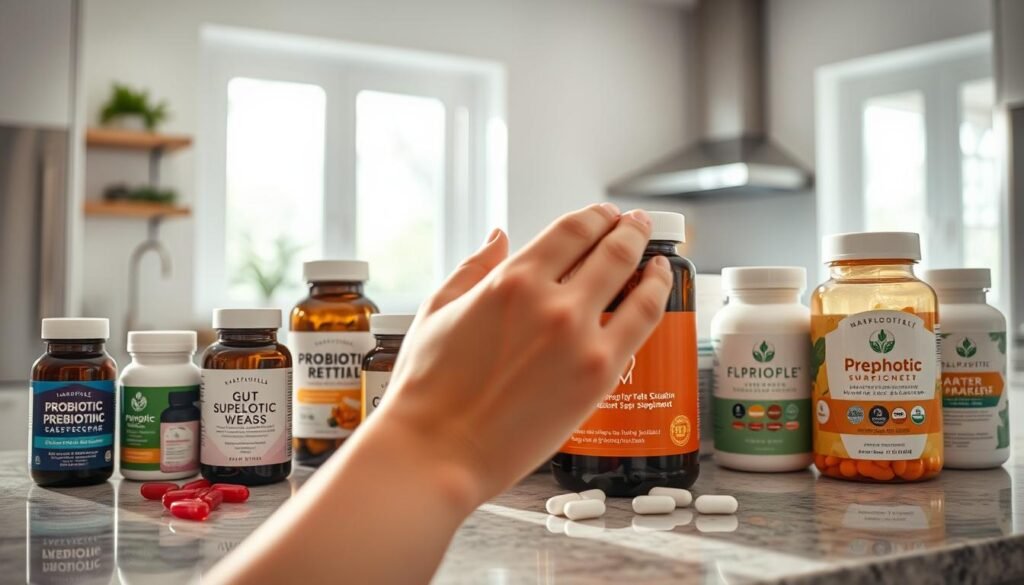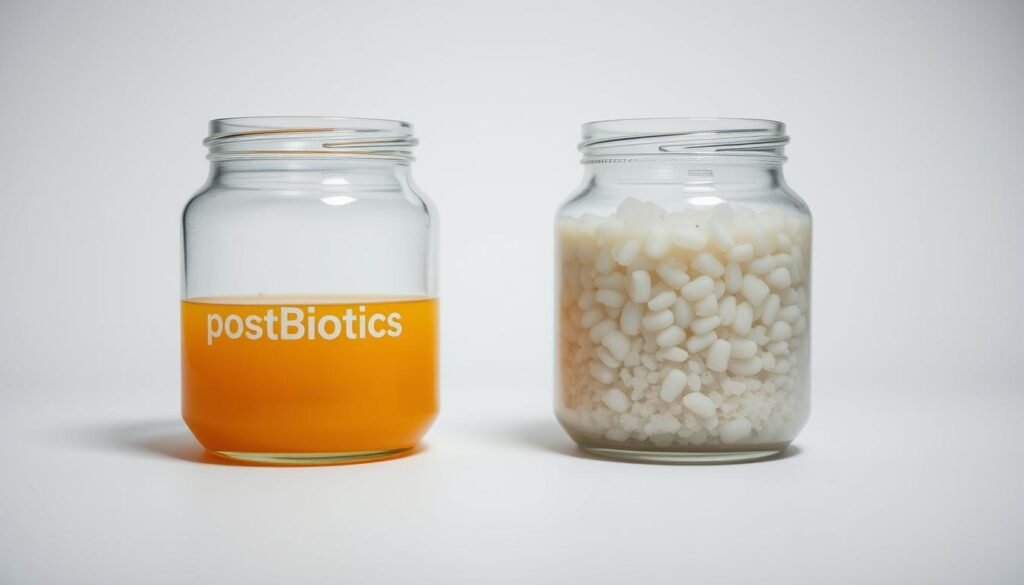In 2026, we’re looking for the best ways to stay healthy. Gut supplements like probiotics and postbiotics are getting more attention. Keeping our microbiome healthy is key to feeling good.
Thank you for reading this post, don't forget to subscribe!More people are interested in probiotics and postbiotics for gut health. This has started a debate on which is better. Knowing the difference between these two is important.
Key Takeaways
- Understanding the role of probiotics and postbiotics in gut health.
- The benefits and differences between probiotics and postbiotics.
- How to choose the right supplement for your needs in 2026.
- The impact of probiotics and postbiotics on overall well-being.
- Emerging trends in gut health supplements.
The Gut Health Revolution of 2026
The gut health revolution is growing fast in 2026. This is thanks to new discoveries in microbiome research. These findings are changing how we think about health and wellness.
Why Gut Health Has Become Central to Wellness
Gut health is now key to wellness because of its big impact on our health. The gut microbiome is vital for digestion, immune function, and mental health. Studies show it’s linked to many aspects of our well-being.
This makes gut health very important. It affects metabolic processes, inflammation, and nutrient absorption. As we learn more about the gut microbiome, keeping it healthy is seen as vital for wellness.
The Latest Breakthroughs in Microbiome Science
New discoveries in microbiome science are driving the gut health revolution. Cutting-edge research techniques help scientists understand the gut microbiome better. These findings show how the microbiome affects our health and lead to new health solutions.
Recent breakthroughs include finding new microbial species. We also know more about how diet, lifestyle, and environment affect the gut microbiome. This knowledge helps create targeted ways to improve gut health and overall wellness.
What Are Probiotics? The Living Pioneers

In the world of gut health, probiotics are key players. They are live microorganisms that help when taken in the right amounts. They play a big role in keeping our gut microbiome balanced.
Definition and Core Mechanisms
Probiotics are live microorganisms that offer health benefits when taken enough. They help by adding good bacteria to our gut. This improves our gut barrier and helps our immune system.
They work by making substances that fight off bad bacteria. They also compete with harmful bacteria for space in our gut. Plus, they help strengthen our gut lining.
Evolution of Probiotic Science
Probiotic science has grown a lot, starting from 2023. There’s been a big leap in understanding how different strains affect our health. This has led to more tailored probiotic treatments.
Leading Probiotic Strains in 2026 Formulations
In 2026, top probiotic strains come from Lactobacillus and Bifidobacterium. Here’s a table showing some top strains and their benefits:
| Probiotic Strain | Health Benefits | Common Applications |
|---|---|---|
| Lactobacillus acidophilus | Improves digestion, boosts immune system | Gastrointestinal health, immune support |
| Bifidobacterium lactis | Enhances immune function, supports gut health | Immune system support, gut health |
| Lactobacillus rhamnosus | Supports gut health, aids in diarrhea prevention | Gut health, diarrhea prevention |
Choosing the right probiotic strains is important for health benefits. Research keeps finding new ways these living pioneers help our gut health.
What Are Postbiotics? The Next Generation
Postbiotics are changing the game in microbiome science. They are made from non-living parts of microbes and help keep us healthy. This makes them key players in our gut health.
Defining the Postbiotic Revolution
The postbiotic revolution is all about better gut health solutions. Unlike probiotics, which are alive, postbiotics are what microbes leave behind. This change is big because it opens up new ways to help us stay healthy.
How Postbiotics Represent a Paradigm Shift
Postbiotics are a big deal because they’re more stable than probiotics. They don’t need to live, so they’re easier to make and keep. This makes them a reliable choice for health products.
Key Postbiotic Compounds and Their Functions
Short-chain fatty acids, peptides, and other by-products are important in postbiotics. They help control our gut bacteria and boost our immune system.
| Compound | Function |
|---|---|
| Short-Chain Fatty Acids | Energy source for colonocytes, anti-inflammatory effects |
| Peptides | Antimicrobial properties, immune system modulation |
| Other Metabolites | Antioxidant effects, gut barrier reinforcement |
By focusing on these compounds, postbiotics are a hopeful way to improve our gut health and overall health.
The Science of Gut Supplements: Mechanisms Explained

It’s important to know how gut supplements work to make smart health choices. Probiotics and postbiotics have different ways of helping us.
How Probiotics Colonize and Transform Your Gut
Probiotics add good bacteria to your gut. This changes your microbiome for the better. The process involves several steps:
- Adhesion to the intestinal lining
- Proliferation of beneficial strains
- Production of beneficial metabolites
How Postbiotics Deliver Ready-Made Benefits
Postbiotics give benefits right away without needing to colonize. They are the byproducts of probiotics, like:
- Short-chain fatty acids
- Peptides
- Other beneficial compounds
These compounds can quickly improve your gut and overall health. They offer a fast and effective way to support your well-being.
Bioavailability Differences: Why It Matters
The bioavailability of probiotics and postbiotics is different. Postbiotics are more easily absorbed because they don’t need to survive digestion. This is key for those looking for quick results.
When picking between probiotics and postbiotics, knowing these differences helps. It lets you choose what’s best for your health goals.
Transformative Benefits of Probiotics in 2026
Research on the microbiome has led to a better understanding of probiotics in 2026. Scientists have learned how these good bacteria can change our health for the better.
Enhanced Digestive Function and Comfort
Probiotics improve our digestion by adding good bacteria to the gut. This makes it easier to absorb nutrients and reduces symptoms of IBS. They help keep our digestive system healthy by adding beneficial bacteria.
Strengthened Immune Resilience
Studies show that probiotics boost our immune system. They help our body fight off infections better. This makes it easier to stay healthy and avoid getting sick.
Gut-Brain Axis Improvements
The gut and brain talk to each other through the gut-brain axis. Probiotics improve this connection, leading to better mental health and thinking skills. They might even help manage stress and anxiety.
Emerging Applications in Preventative Health
Probiotics are also being looked at for preventing diseases. They might help stop chronic conditions like diabetes and heart disease. Research suggests they could be a key part of staying healthy in the future.
Revolutionary Benefits of Postbiotics in 2026

Postbiotics are changing the game in gut health in 2026. They are made by probiotics and open up new areas in microbiome science.
Advanced Microbiome Regulation
Postbiotics offer advanced microbiome regulation. They create a space for good bacteria to grow. This balance is key for a healthy gut.
They help lower inflammation and boost gut health.
Precision Immune Modulation
Postbiotics are great at modulating the immune system with precision. They help the body fight off diseases better.
Metabolic Optimization Capabilities
Postbiotics also help with metabolic optimization. They help the body use nutrients well and keep energy levels stable.
This is important for overall health, supporting many bodily functions.
Cutting-Edge Therapeutic Applications
The uses of postbiotics are wide-ranging. They can help with gut issues and even mental health.
Research in 2026 is exploring these uses, leading to new treatments for many health problems.
In summary, postbiotics are a big step forward in gut health. They offer benefits from regulating the microbiome to new treatments.
Head-to-Head Comparison: Stability, Speed, and Effectiveness
Exploring gut health, we find big differences between probiotics and postbiotics. These differences affect how well they work. It’s key to look at their stability, how fast they work, and their overall effectiveness.
Shelf-Life and Environmental Resilience
Postbiotics last longer than probiotics because they’re not alive. They can handle changes in temperature and moisture better. Probiotics, being live, need to be stored carefully to stay potent.
- Postbiotics: Can last 2-3 years without needing to be refrigerated.
- Probiotics: Need to be kept cold and last about 1-2 years.
Survival Rates Through Digestive Processes
Probiotics struggle to survive the digestive tract’s harsh conditions. Postbiotics, already processed, don’t face these challenges.
Studies show probiotics often don’t make it to the intestines in good shape. This reduces their effectiveness.
Onset of Action and Duration of Benefits
Postbiotics work faster because they’re already active. Probiotics take longer to start working.
- Postbiotics: Benefits can be seen in a few days.
- Probiotics: It may take weeks to notice improvements.
Cost-Effectiveness Analysis
Probiotics might seem cheaper at first, but their effectiveness can be limited. Postbiotics, though pricier, offer better value because of their stability and quick action.
When looking at cost-effectiveness, think about the total cost. This includes storage needs and the chance of getting the health benefits you want.
In conclusion, choosing between probiotics and postbiotics depends on what you need. Knowing their differences helps you make the best choice for your gut health.
How to Select the Perfect Gut Supplements for Your Health Goals

Choosing the right gut supplement can change your health journey in 2026. With many options, knowing what you need is key.
Step 1: Identify Your Primary Health Objectives
Start by figuring out what you want from your gut supplement. Do you want to improve digestive health, boost your immune system, or clear your mind? Each goal might need a different supplement.
Step 2: Consider Your Unique Health Profile
Your health history and current state are important for picking the right supplement. For example, someone with a weak immune system might need a different supplement than someone with a strong one.
Step 3: Evaluate Compatibility with Your Lifestyle
Your lifestyle, including diet, exercise, and stress, affects how well a supplement works. Let’s look at how different lifestyles impact your choice:
For Active Individuals and Athletes
If you’re active, supplements that aid in recovery and muscle health might be best. Probiotics help keep your gut healthy, and postbiotics offer extra anti-inflammatory benefits.
For Busy Professionals with High Stress
Those with chronic stress can benefit from gut supplements. Postbiotics are great here because they offer quick stress relief.
For Seniors Seeking Digestive Support
Seniors often struggle with digestion. Probiotics can help, but it’s important to pick strains that work well for older adults.
By thinking about your health goals, profile, and lifestyle, you can choose wisely. Whether it’s probiotics, postbiotics, or a mix, find what fits your health plan.
Your Step-by-Step Guide to Starting Probiotics
Starting probiotics can change your gut health for the better. It’s all about making smart choices. To get the most out of probiotics, follow a clear plan.
How to Identify Premium Probiotic Formulations
When picking a probiotic, look for clinically validated strains and scientific research backing. Make sure it has a good CFU (Colony-Forming Units) count. Also, choose a product from a trusted company. Look for third-party tests and certifications for quality and purity.
- Research the strains used and their benefits
- Verify the CFU count per serving
- Check for allergens or additives if you have sensitivities
Determining Your Ideal Dosage Strategy
Finding the right dose is key. It depends on your health goals and the probiotic strains. Start with a lower dose and increase as needed. Always follow the product’s advice or talk to a healthcare professional.
- Begin with a standard dose (1-2 billion CFU)
- Monitor your body’s response
- Adjust the dosage based on your health goals and tolerance
Optimal Timing and Consumption Methods
Timing is important for probiotics. Taking them on an empty stomach or with food can affect how well they work. Some products are best taken at certain times for better results.
- Take probiotics with a meal or immediately after
- Avoid consuming probiotics with hot beverages
- Store probiotics according to the product’s instructions
Tracking Progress and Adjusting Your Approach
Keep a health journal to track your progress. Note any changes in digestion, energy, or overall health. Adjust your probiotic plan based on your observations. If needed, talk to a healthcare professional.
“The key to benefiting from probiotics lies in consistency and patience. It may take several weeks to notice significant changes.”
By following these steps and staying committed, you can unlock the full benefits of probiotics. This will improve your gut health and overall well-being.
Your Step-by-Step Guide to Starting Postbiotics
Starting postbiotics can seem hard, but with a good guide, you can make smart choices. It’s important to approach starting postbiotics carefully to get the most benefits for your gut.
Sourcing High-Quality Postbiotic Products
When picking postbiotic products, look for ones that have scientific backing and tested strains. Make sure the maker follows good practices and labels the product clearly.
Understanding Advanced Dosing Protocols
Dosing for postbiotics can change based on the product and your health goals. Usually, a daily dose is recommended. But, always follow the product’s advice or talk to a doctor to find the right amount for you.
Integration Strategies for Maximum Efficacy
To get the most from postbiotics, add them to your daily routine. Taking them with meals might help them work better. Also, eating a fiber-rich diet and drinking plenty of water can boost their effect.
Measuring Success and Fine-Tuning Your Regimen
It’s important to watch how your body reacts to postbiotics. Notice any changes in digestion, energy, or overall health. If you see improvements or need changes, talk to a doctor before making any adjustments.
| Postbiotic Benefit | Indicators of Success | Adjustment Strategies |
|---|---|---|
| Improved Digestion | Reduced bloating, regular bowel movements | Adjust dosage, consider taking with food |
| Enhanced Immune Function | Fewer instances of illness, improved overall health | Consult a healthcare professional for personalized guidance |
| Increased Energy | Notable improvement in daily energy levels | Monitor and adjust dosage as needed |
By following these steps and listening to your body, you can unlock the full benefits of postbiotics for your gut health.
Making the Final Decision: Probiotics vs Postbiotics in 2026
Choosing between probiotics and postbiotics depends on your health needs and goals. Understanding each option helps you make a choice that fits your wellness goals.
When Probiotics Are Your Best Option
Probiotics are great for those wanting to colonize their gut with beneficial bacteria. They’re good for improving digestion, boosting immunity, and supporting gut-brain health. They’re best for people whose gut bacteria has been affected by antibiotics, illness, or a bad diet.
When Postbiotics Will Serve You Better
Postbiotics are a good choice for those needing immediate benefits or have a sensitive stomach. They are the byproducts of probiotics and offer ready-made benefits. This makes them ideal for people with weak immune systems or those who can’t handle probiotics.
Scenarios Where Combining Both Creates Synergy
Using both probiotics and postbiotics together can be very effective. This mix can be great for people with complex health issues. It combines the benefits of gut colonization and immediate metabolic support.
Decision Framework for Different Health Conditions
Here’s a simple guide to help you decide:
| Health Condition | Recommended Supplement | Rationale |
|---|---|---|
| Digestive Issues | Probiotics | Enhances gut colonization and digestive function |
| Compromised Immune System | Postbiotics | Provides immediate immune support without live bacteria |
| Complex Health Issues | Both Probiotics and Postbiotics | Creates synergy for complete gut health support |
Choosing between probiotics and postbiotics should be based on your health and goals. Talking to a healthcare professional can help you make the right choice for your gut health.
Navigating Possible Side Effects and Precautions
Probiotics and postbiotics have many health benefits. But, it’s important to know about their side effects and precautions. This ensures safe and effective use.
Understanding Common Probiotic Reactions
Probiotics can cause bloating, gas, or mild stomach discomfort at first. These symptoms usually go away as your gut adjusts.
Recognizing Postbiotic Adjustment Periods
Postbiotics might also cause adjustment periods. You might notice changes in bowel movements or mild digestive discomfort. It’s key to watch these effects to find the right dosage and type of postbiotic.
Red Flags That Warrant Medical Consultation
Severe or ongoing side effects like intense abdominal pain or significant bowel changes need immediate medical help. It’s important to know the difference between normal adjustments and serious reactions.
Safe Transitioning Between Supplement Types
When switching from probiotics to postbiotics or the other way around, start with a small dose. Gradually increase it as needed, watching for any bad effects. Getting advice from a healthcare professional can be very helpful.
| Supplement Type | Common Side Effects | Precautions |
|---|---|---|
| Probiotics | Bloating, gas, mild stomach discomfort | Start with a low dose, monitor for persistent symptoms |
| Postbiotics | Changes in bowel movements, mild digestive discomfort | Gradually increase dosage, consult healthcare professional if needed |
Knowing about possible side effects and taking precautions helps you use probiotics and postbiotics safely. This way, you can enjoy their benefits for better gut health.
“The key to successfully integrating probiotics and postbiotics into your health regimen lies in being informed and cautious, allowing you to maximize their benefits while minimizing possible side effects.”
Conclusion: Embracing Your Personalized Gut Health Journey
As we wrap up our look at probiotics and postbiotics, it’s clear that everyone’s gut health journey is different. Your path is shaped by your diet, lifestyle, and health goals.
Knowing the difference between probiotics and postbiotics helps you make choices that fit your needs. Whether you want better digestion, a stronger immune system, or overall wellness, picking the right supplement is key.
By taking a personalized health approach, you can control your gut health. This can greatly improve your life quality. Remember, being patient and persistent is important as you start your journey.
With the right supplement, a balanced diet, and a healthy lifestyle, you can unlock your gut health’s full power. Enjoy the benefits of better overall wellness.
FAQ
What is the main difference between postbiotics and probiotics?
Postbiotics are made by probiotic bacteria but are not alive. Probiotics, on the other hand, are live bacteria that help your health when taken in the right amounts.
How do probiotics work in the gut?
Probiotics add good bacteria to your gut. This helps with digestion, boosts your immune system, and connects your gut and brain. It leads to better overall health.
What are the benefits of taking postbiotics?
Postbiotics help control your gut’s bacteria, boost your immune system, and improve how your body uses energy. They offer these benefits without needing live bacteria to grow in your gut.
Are postbiotics more stable than probiotics?
Yes, postbiotics last longer and are more stable than probiotics. This is because they are not alive and can handle stress better.
Can I take both probiotics and postbiotics together?
Yes, taking both can be good. It combines the live bacteria of probiotics with the benefits of postbiotics. This might help your gut health even more.
How do I choose between probiotics and postbiotics for my health goals?
Think about what you want to achieve for your health. Consider your health needs and lifestyle. Decide if probiotics, postbiotics, or both are right for you.
What are the common side effects of probiotics?
Taking probiotics might make you feel a bit uncomfortable at first. You might feel bloated or gassy. But these feelings usually go away as your body gets used to it.
How do I recognize an adjustment period when taking postbiotics?
Taking postbiotics might cause some mild stomach issues or other symptoms at first. But these should get better as your body adjusts.
When should I consult a healthcare professional about gut supplements?
If you have serious or ongoing side effects, or if you have health issues that could be affected by gut supplements, talk to a healthcare professional.
Can I switch between probiotics and postbiotics, and how?
Yes, you can switch between them. But it’s best to do it with the help of a healthcare professional. They can guide you safely and help you adjust your routine as needed.
Are there specific health conditions that favor the use of probiotics over postbiotics or vice versa?
Some health issues might be better treated with probiotics, like gut problems. Others might benefit more from postbiotics, like improving how your body uses energy.

